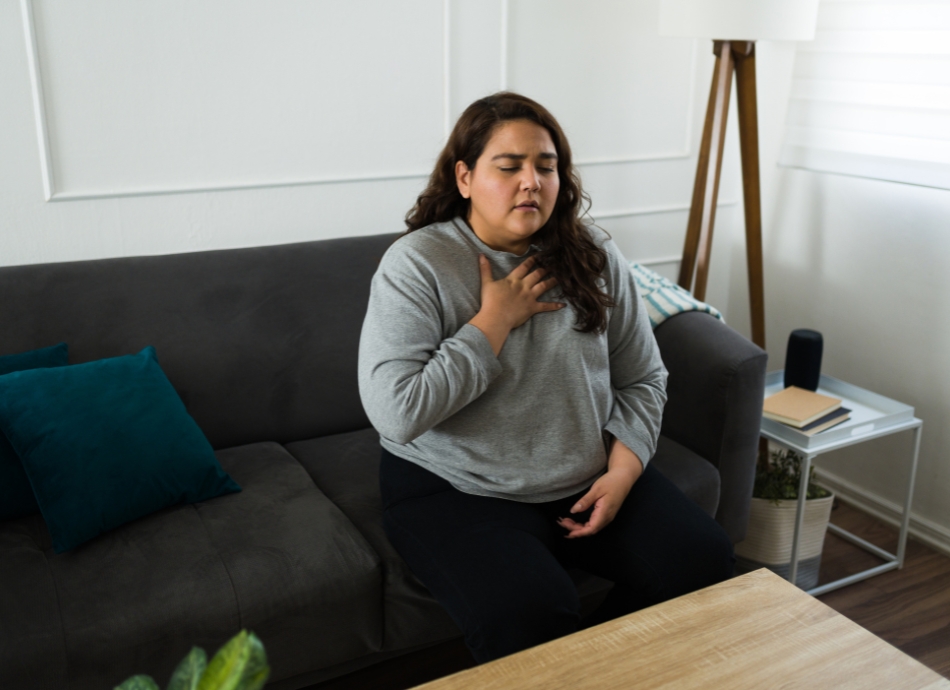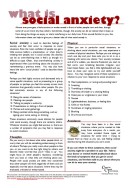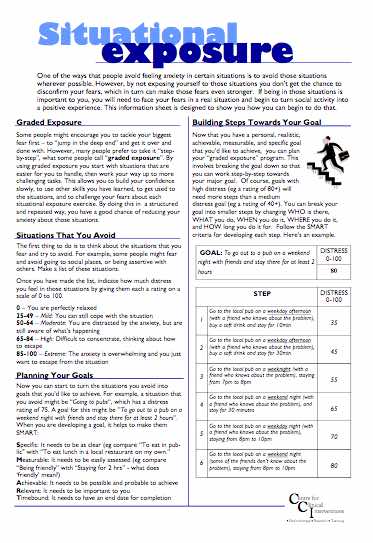Phobias
Key points about phobias
- Phobias are a form of anxiety disorder, in which your anxiety gets attached to a specific object or situation.
- Phobias most often start in your childhood or twenties but can develop at any age, particularly after a traumatic experience.
- Most phobias are more common in women.
- Phobias are not harmful in themselves but avoiding what you fear, or developing unhealthy coping strategies to deal with your phobia, can have a negative impact on your life.
- Some phobias can last for many years or even your whole life unless you get help with them.
- The good news is that if you get help, most people recover from or learn to manage their phobia much better.

Phobias are a form of anxiety disorder. A phobia is an extreme, often unreasonable or irrational fear of something.
Phobias cause an exaggerated and unpleasant response when you're exposed to the object or situation that you fear. These fears get in the way of your everyday routines, your work and relationships.
You’re more likely to develop a phobia if you have a whānau member with a phobia.
Treatment is tailored to you and your specific fear, and may include other conditions you may have, eg, depression or drug abuse.
There are 3 main types of phobias.
- Specific phobias: Fear of a specific object, situation or animal.
- Social phobia (also known as social anxiety disorder): Fear of social activities or situations where you may feel helpless, judged or embarrassed.
- Agoraphobia: This includes:
- fear about safety when you're away from home
- fear of places where you might have a panic attack and be unable to get help
- fear of public, closed or crowded places where you can feel trapped (hard to escape) and unable to get help.
Specific phobias
Specific phobias are very common. You may have a mild dislike of something, which doesn't affect you very much, through to a full phobia, which will affect your day-to-day life.
There are 5 types of specific phobias:
- fear of animals, eg, dogs, snakes or spiders
- fear of the natural environment, eg, darkness
- fear of blood and needles
- fear of specific situations, eg, flying
- other fears, eg, a fear of clowns.
As an example, if you are phobic of dogs, you will feel extremely anxious anywhere near a dog and want to get away from it quickly. You will avoid dogs (and people/places with dogs) if at all possible. This happens even though you may realise your fear is unreasonable and you miss out on social interactions. Once you leave the situation you feel fine.
Social phobia
A social phobia, known as social anxiety disorder, is a fear of being embarrassed or judged negatively in social situations. It leads to an overwhelming and persistent fear of social situations and interactions. It’s common for most of us to have moments where these situations can feel a bit daunting, but someone with social phobia experiences strong anxiety or panic in most social situations.
If you have this type of phobia, you feel anxious that you will act in a way or show anxiety symptoms that will be humiliating or embarrassing. This can lead to avoiding social situations, which affects your ability to create or maintain relationships. It can seriously affect your quality of life, employment and career goals.
Find out more about social phobia.
Agoraphobia
Agoraphobia is a fear of public places (open or closed) or situations that would be difficult to get away from or get help in, eg, shopping malls or movie theatres. As a result, people with agoraphobia often experience severe panic attacks. It’s a more severe and complex form of phobia.
Find out more about agoraphobia.
Video: Phobias – specific phobias, agoraphobia and social phobia
There are several factors that might play a part in developing phobias.
- A specific incident – for example, if you experienced a lot of turbulence on a plane at a young age without adequate reassurance, you might later develop a phobia about flying.
- Trauma – if you experienced abuse in a particular setting, you may develop a phobia about similar places or an object or certain demographic groups you associate with the abuse. You can also develop a phobia from seeing others going through a traumatic event.
- Family environment – parents who are very worried or anxious can affect how you cope with anxiety in later life, and you may even develop the same phobia as a parent or older sibling (brother or sister).
- Hearing about a traumatic event – if there's a lot of talk or media coverage about a threatening or traumatic event, eg, a plane crash.
- Genetics – some people appear to be born with a tendency to be more anxious than others, which can develop into a phobia.
- Responses to panic or fear – if you have a strong reaction (a panic attack) in response to a particular situation or object, you may find this embarrassing or be aware of people around you reacting strongly. This can cause you to develop a more intense anxiety about being in that situation again.
- Long-term stress – this can cause feelings of anxiety and depression and reduce your ability to cope in particular situations. This can make you feel more fearful or anxious about being in those situations again and, over a long period, may lead to you developing a phobia.
At times, you may not know or be able to recall the specific reason why you developed a phobia.
Symptoms of a phobia appear when you come into contact with the object, creature or situation that you fear. However, sometimes even thinking about the source of the phobia can make you feel anxious.
Symptoms can range from mild anxiety to a full-blown panic attack and can include:
- dizziness and light-headedness
- sweating
- racing or pounding of your heart
- shortness of breath or feeling smothered
- trembling or shaking
- chest pain or tightness
- nausea, an upset stomach or diarrhoea (runny poo)
- feeling cut off from reality
- fainting (if you have blood-injection-injury phobia)
- a sense of overwhelm and helplessness.
You may have distressing thoughts and feelings associated with a phobia or you may feel the need to escape before you lose control.
Your healthcare provider will make the diagnosis of a phobia if you've been experiencing the following for at least 6 months:
- An unreasonable, excessive, persistent and intense fear triggered by a specific object or situation.
- An immediate anxiety response to this fear, which is out of proportion to the actual danger.
- You go out of your way to avoid the object or situation, or you bear it with extreme distress.
- Fear that has a significant negative impact on your life.
People with phobias can develop other problems, such as other anxiety disorders, depression or alcohol/drug-use disorders. If you think you, or someone you know, is experiencing a phobia it’s important to talk to a healthcare provider.
Most people who experience phobias find relief from their symptoms when treated with therapy, medication and education – or a combination of these. There are many things that people develop a phobia of, so don’t worry if you have an unusual phobia – the treatment and self-help methods will work for you as well.
Education
Education can be a helpful first step towards recovering from or managing a phobia better. You can start by looking at the websites and other resources suggested below. They can help you to:
- understand how phobias develop
- find ways of describing what happens to you, including problems that you may have kept completely to yourself up to now
- teach you about some of the ways of dealing with a phobia
- learn about how addressing your anxiety is key to reducing phobias
- realise that you're not alone – lots of people experience phobias and most of them recover from them or at least learn to manage them much better.
Counselling or therapy
There are trained professionals who know about phobias and how to help someone who is affected by them. They can provide you with support and help for working through any distressing thoughts and feelings you have and support you to make positive changes in your life.
For some people, it might be helpful to understand why their phobia developed and treatment may involve processing earlier trauma. For others, this isn't important or useful and instead they want to focus on changing their perceptions and behaviour.
Cognitive behavioural therapy (CBT) is a psychological therapy that largely focuses on overcoming unhelpful beliefs. It can be helpful for people with specific phobias. Therapy will involve desensitisation, that is, you gradually having more exposure to the object or situation you feel anxious about. Don’t worry – this only happens when you're ready and at a pace that's right for you. It’s a very effective step in overcoming a phobia. Read more about situational exposure(external link).
Eye-Movement Desensitisation and Reprocessing Therapy (EMDR), unlike purely talking therapies, is a neurological intervention that will help your brain and body separate negative associations with the object of the phobia and replace them with more helpful ones. EMDR therapy involves bilateral stimulation (can be eye-movements, tapping, or listening to sound) administered to you by an EMDR trained therapist. Read more about EMDR(external link).
Medicines
Medication isn't usually recommended for treating phobias, because talking therapies are usually effective and don't have any side effects. However, medicine is sometimes prescribed on a short-term basis to treat the effects of phobias, eg, anxiety.
Examples of medicines that can be used to treat anxiety include:
- Antidepressants: Selective serotonin reuptake inhibitors (SSRIs) are most often prescribed to treat anxiety, social phobia or panic disorder. They are most effective when used alongside counselling or therapy.
- Benzodiazepines: these may be used on a short-term basis to treat severe anxiety until the most effective therapy for you have been found. You can become dependent on benzodiazepines so they’re generally used at the lowest possible dose for the shortest time.
Complementary therapies
The term complementary therapy is generally used to indicate therapies and treatments that differ from conventional Western medicine and that may be used to complement and support it. In general, mindfulness, hypnotherapy, yoga, exercise, relaxation, massage, mirimiri (traditional Māori massage) and aromatherapy have all been shown to have some effect in easing mental distress.
The key things you can do to help yourself are to:
- learn about phobias and how to manage and improve your condition
- learn a relaxation technique or mindfulness practice
- get help if you need it
- join a support group
- stretch yourself 1 small step at a time in facing the phobia
- stay connected to others
- stay engaged with the rest of your life that’s not affected by a phobia
- avoid alcohol, caffeine and other drugs
- be physically active
- spend time in nature
- eat a healthy diet
- get enough sleep
- find a greater purpose.
Find out more about living well with phobias.
Apps reviewed by Healthify
You may find it useful to look at the oVRcome app or some Anxiety management apps.
Anxiety NZ Trust(external link) Free 24/7 National Anxiety Helpline phone 0800 ANXIETY (0800 269 4389)
Find a GP or Counsellor(external link) Mental Health Foundation of NZ
Grow(external link) Support groups for mental wellness using the 12-step programme run by people who have experienced mental illness.
Togetherall(external link) UK
The following links provide further information about phobias. Be aware that websites from other countries may have information that differs from New Zealand recommendations.
Phobias(external link) Mental Health Foundation, NZ
Phobias(external link) NHS, UK
Apps
Anxiety management apps
oVRcome app
Brochures
What is needle phobia?(external link) Centre for Clinical Interventions, Australia
Overcoming needle phobia(external link) Centre for Clinical Interventions, Australia
What is social anxiety?(external link) Centre for Clinical Interventions, Australia
Situational exposure(external link) Centre for Clinical Interventions, Australia
How to manage anxiety and fear(external link) Mental Health Foundation, UK
References
- Understanding phobias(external link) Mind, UK, 2021
- Phobias(external link) Mental Health Foundation, NZ, 2022
- Salmon P. Effects of physical exercise on anxiety, depression and sensitivity to stress – a unifying theory(external link). Clin Psychol Rev. 2001;21(1):33–61.
- Nutritional strategies to ease anxiety(external link) Harvard Health Publishing, US, 2019
- Phobias – symptoms(external link) NHS, UK, 2022
Anxiety disorders – CPG and associated resources(external link) RANZCP, 2018
Generalised anxiety disorder in adults – management(external link) UpToDate, US 2024 (requites login)
Generalised anxiety disorder and panic disorder in adults – management(external link) NICE, UK, 2011 (updated 2020)
Generalised anxiety disorder in adults(external link) Best Practice Journal (BPJ) and Best Practice Advisory Centre NZ, 2009
The role of medicines for the treatment of depression and anxiety in young people aged under 18 years(external link) BPAC, NZ, 2016
Webinar
Understanding breathing pattern disorders – Scott Peirce, MHSc Physiotherapy (1:09:11)
Brochures

What is social anxiety?
Centre for Clinical Interventions, Australia

Centre for Clinical Interventions, Australia
Credits: Healthify editorial team. Healthify is brought to you by Health Navigator Charitable Trust.
Reviewed by: Dr Adrienna Ember Clinical Psychologist, Waikato
Last reviewed:





